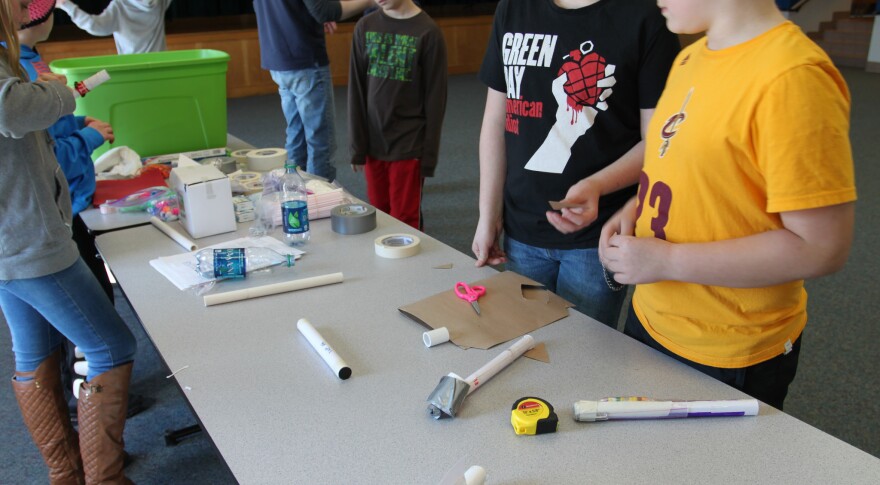HAMPDEN, Maine - Think 4-H and you probably picture boys and girls raising lambs or grooming prize bulls for the county fair. While traditional farming activities are still a major focus, 4-H is expanding to prepare kids for a changing world - most notably in science, technology, engineering, and math - or STEM. At one club in Hampden, activities are just as likely to focus on robots or rockets, as on potatoes or poultry.
When the last bell of the day rings at Reeds Brook Elementary School, a couple dozen kids don't rush home; instead, they rush to the school auditorium.
"There's going to be a twist today, too. Notice the stage," says Greg Kranich.
"Oh...," the kids respond.
"The island might move up to the stage...eventually," Kranich says.
Greg Kranich is a University of Maine graduate student in physics, one of several 4-H STEM ambassadors who devise science and math projects for the 4-H club kids. Today, it's "Rockets to the Rescue," where the kids have to deliver a rocket carrying emergency supplies to a disaster-struck "island." The island is a hula hoop on floor, the rocket is a paper cylinder fired out of a plastic tube, and the payload consists of plastic beads.

But the mission is designed to teach several things, such as velocity, trajectory, and mass. Lesson number one: Don't expect to get anything right on the first try. "I had them start with just a bare-bones model, and had it fail - very first time," Kranich says. "We've got to find out what fails in order to make it better. And so they work together, based on their observations, they'll focus on what improvements they need to make."
Kranich says in a regular class, students often feel pressured to come up with the right answer, right away, and that can be a confidence killer. Students are also more inclined to safeguard rather than share their classroom work. But today's 4-H lesson is designed to show that science thrives on experimentation and the free exchange of ideas.
At the work table, student David is fitting his team's failed rocket with a new wing design. "Yeah, cut it like this. Yeah, a thin triangle," he instructs. "It's a good size, I guess, for a wing."
Jennifer Mitchell: "And if it doesn't work, what are you going to do?"
David: "Uh, new wings."
One team's rocket has just fallen well short of the target. "So think about what we can change," Kranich says.
"Take some more more weight off it," says one kid.
"More weight. Anything about the launch?" Kranich presses.
"More power," another kid says.
That's Max and Brooklyn, troubleshooting their launch with Kranich. Of the 20 or so kids that have come today, Brooklyn is the only girl in the room. "So why do you do this? This class?" I ask her.
"I don't know - I like to know how things work," Brooklyn says. "Yup, that's pretty much it. I like to know how they're built and how they work."
Brooklyn says she's often called a "tom boy" for the things she likes to do, including her fondness for taking stuff apart. Like many kids, she has no idea what career she'd like to pursue after school.
But according to a study from the National Bureau of Economic Research in Cambridge, Massachusetts, girls like Brooklyn face an uphill battle. They're less likely to receive encouragement from their teachers in pursuing high level math and technology than boys are.
That doesn't surprise, Alice Phibrick, a former STEM ambassador who now works as an educator for 4-H. "I had a similar experience myself," she says, "and I think that schools and clubs are much more attentive to that now and are trying to get girls engaged. I think that there's still that mind set in the general population as well. And that's hard to overcome, but we're trying to."
Getting more girls to come to programs like the 4-H STEM activities, is important, she says. STEM skills are going to be essential for job-seekers in the future.
But does this new focus on STEM mean that 4-H, now embarking on its second century, is losing its traditional focus on farming? Laura Wilson, who runs the 4-H science programs, says no.
"What our 4-H mission is, is actually positive youth development," she says. "Those traditions in agriculture, those traditions in those animal science programs, they were always for youth to develop life skills so that they could become productive members of society. Happy, healthy adults. So, it's not a reach at all."
Other programs Wilson says 4-H is exploring include robotics engineering, film making, and in Maine the group just launched its pilot Follow-A-Researcher program, where kids are able to see and chat live with scientific researchers working in the field.



